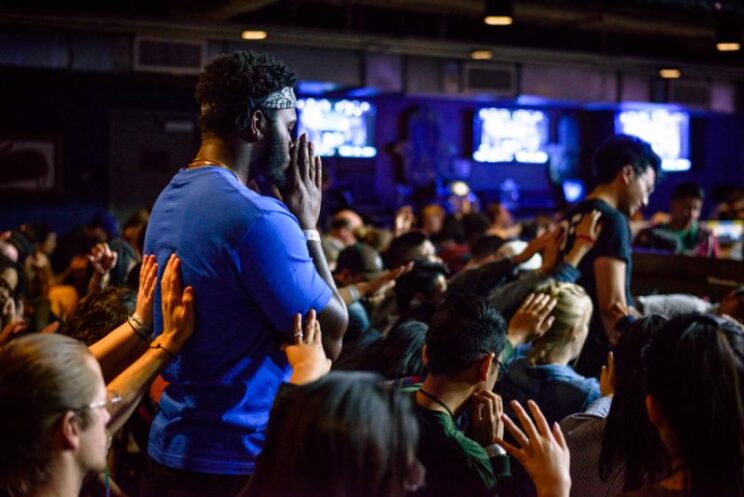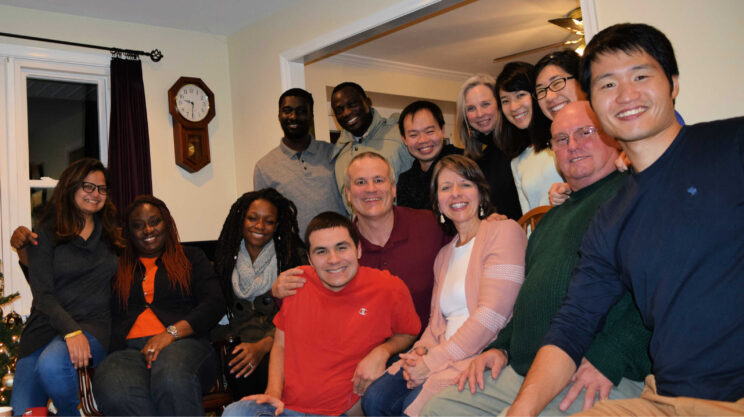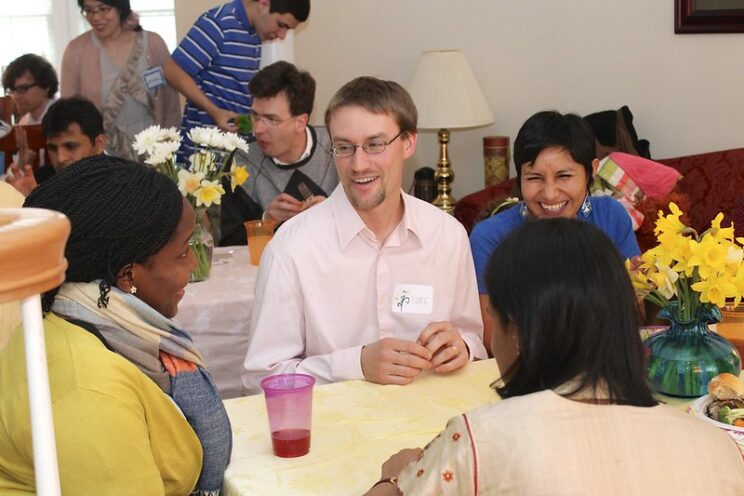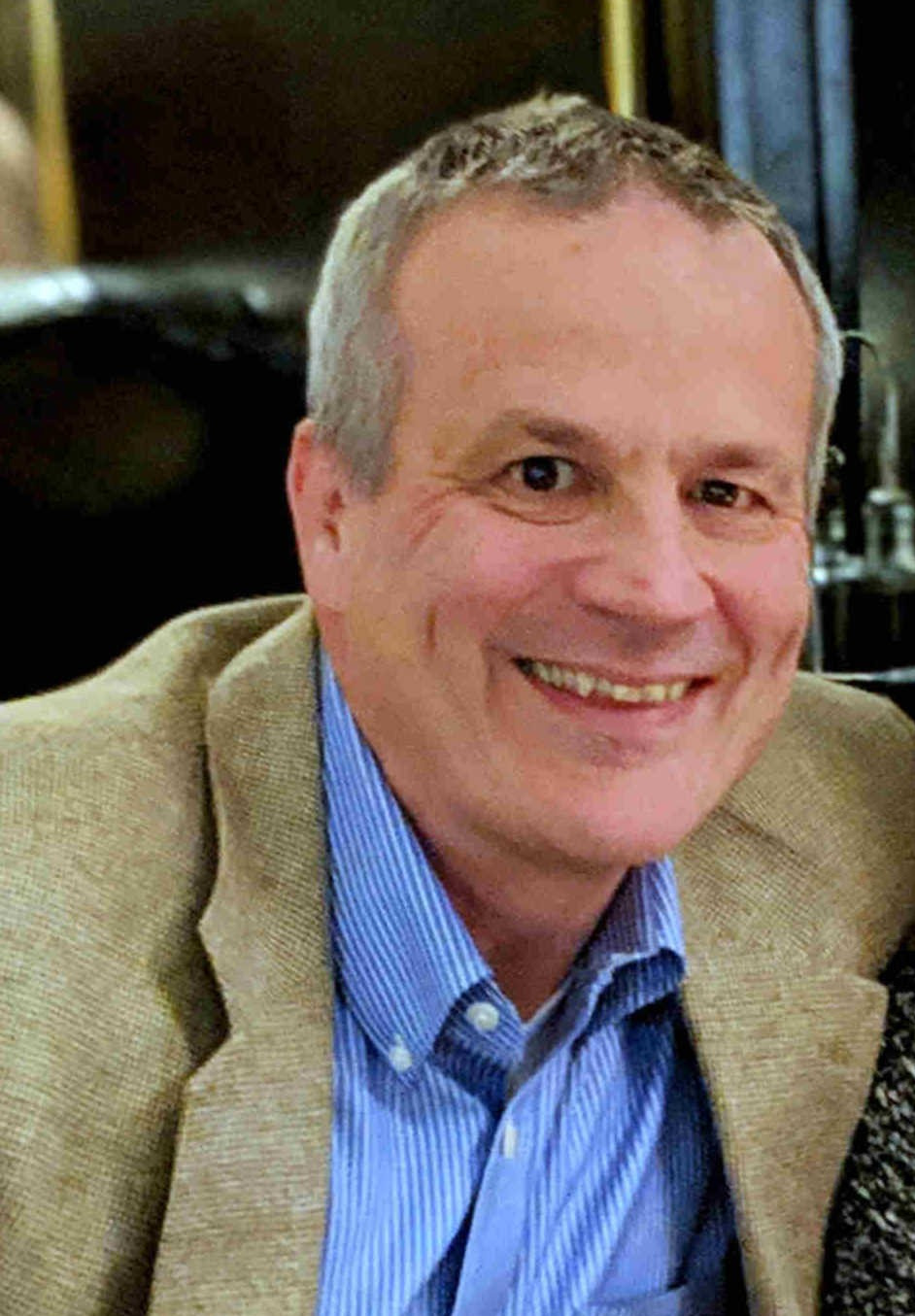
This post is the first in a projected six-part series revealing the gifts Christians from other countries bring to our American campus communities and churches.
The American church suffers historic declines in participation and credibility. The losses would be even greater absent the steady growth of religious groups drawing large numbers of immigrants. Meanwhile, Christianity booms overseas. The fastest-growing Christian communities are in more populous non-Western countries.[1] With the U.S. home to more immigrants than any other country, more Christians are migrating to the United States.[2] As we actively listen to their insight, perspective, and wisdom, our faith can become more complete. Their presence and voice bring hope for renewal within the American church.
Here in part 1 of our Global Gifts series, I relate themes from the early church to today, sharing inspiring examples of God’s work through foreign-born residents in America. My InterVarsity (IVCF) International Student Ministry (ISM) staff colleagues will join us over the next several weeks as we explore God’s unique work through specific people groups.
Decentering the (White) American Church

Born in Baltimore, I am a White male serving Christ at Johns Hopkins University. Along with my co-writers, I care deeply about the American church.
Given current trends, it is vital that American Christians humbly learn from sisters and brothers in Christ worldwide. Generation Z—the oldest turning 27 this year—has become the most unchurched generation in U.S. history.[3] Roughly two-thirds of churchgoing teenagers leave when they graduate from high school, concludes author and pastor Reese Carlson, based on numerous research studies.[4]
Pastor Carlson cites young people’s belief that the church doesn’t share its social justice concerns as a cause for their perceptions of its irrelevance. “Gen Z expects brands to take a stand on social causes and is likelier to buy from a brand that aligns itself with a cause,” says Carlson.[5] Gen Z’s pursuit of “climate change, racial justice, and gender equality is fast becoming a defining feature of the generation,” says Rachel Hatzipanagos of The Washington Post. Barna researchers conclude that young people’s perceptions of the church’s lack of impact on poverty and justice “could pose barriers to belief and should be taken seriously by church leaders.”
Gifts for Addressing Injustice

Issues of poverty and justice similarly threatened the early church community in Jerusalem. Greek-speaking widows suffered discrimination in the early church’s daily food distribution (see Acts 6:1-6).
To avert a crisis, Jerusalem’s ministry leaders sought help from the minority community born outside Palestine. They commissioned seven Grecian Jews, giving them authority over the distribution.
Afterward, the word of God spread, and the church multiplied greatly as at least some of these foreign-born fellow workers extended their service into cross-cultural evangelism.[6]
Wise majority culture church leaders today also seek perspective and share power and resources with ethnic minorities. Global voices help illuminate how the American church has often been silent on race and immigration ethics.
Cecilia Gonzalez came to the U.S. as an international student. Born in Ecuador, Cecilia shines a light on how the American church has too often been silent about racism and immigration ethics. As volunteer campus ministers, she and her husband Nate formed and now facilitate our JHIF multinational Faith in Action small group. Their group meets weekly, sharing Scripture, stories, and perspectives and building relationships with, learning from, and advocating for minority communities in Baltimore and beyond.
Gifts for Engaging Diversity
Empowered as equal ministry partners, many global Christians help us address poverty and injustice. They can also help the American church become more inclusive, equipping Christ’s body to reach U.S. Gen Zers, the most ethnically diverse generation in American history.[7]
The varied church leadership team in first-century Antioch provides a second early church paradigm for engaging our increasingly diverse communities (Acts 13:1-3). Antioch was a massive city with an eclectic mix of separated cultures and ethnicities.
The believers in Antioch saw the division as a barrier to the gospel. The Holy Spirit led them to form a mixed core ministry team that comprised their city community’s ethnocultural and socioeconomic diversity.[8]
Bearing witness to Jesus’ power transcending cultures, they prioritized faithful gospel proclamation and acts of compassion. Paul used Antioch as his base for three successive missionary tours.[9] Antioch’s believers engaged in global outreach within their city, a crossroads for international travelers. As a “daughter” church, they gladly gifted their Jewish brothers and sisters in Jerusalem during a severe famine (Acts 11:27-30).
Taylor Straatman recently spoke of her encounter with a Christian community resembling the first-century Antiochian church. A first-year Northeastern College in Boston, Taylor sought answers about Jesus. She joined the Christian Fellowship’s welcome activity, finding beauty in how the ethnically diverse community cared for her and each other.
At the Chinatown restaurant, Edwin, a freshman from Hong Kong, hosted her through the evening. “He poured my tea, walked me through the menu, and helped me order things,” said Taylor. “I felt so cared for and hosted.”
After Taylor came to faith, she and Edwin led an international small group. Taylor credits Edwin with challenging her to see that the good news about Jesus is so precious that we invite everyone in the student center. “[Edwin’s] heart led [us] in seeing different parts of the campus that we would have missed,” Taylor said.
Our traditionally American JHU Graduate Christian Fellowship (GCF) is similarly experiencing God in deeper ways through the presence and voices of new international students from Africa, East Asia, and Latin America. Their sacrificial love and service challenge us as American students and campus ministers in our commitment to Christ, thinking about the Christian community, and how we make space for God to do new things. Our now multinational community provides a richer expression of our unity in Christ, necessary for the world to know that God has truly sent him and loved them (Jn 17:23).
Resources to Consider
Engaging in Multinational Race Conversations
This resource provides practical, concise guidelines for constructive dialogue with a global perspective.
Every Corner, Every Campus, Every Country: Receiving the Gifts of the Global Church
This June 20-22, National IVCF ISM leaders will lead this online interactive training course with guest presenters from three continents. Roleplays, training tools, videos, and more are offered during six 90-minute sessions spread over three days. Participants will learn how to form and grow multinational communities to reach their Gen Z campuses better locally. Campus Ministry staff are encouraged to extend invitations to fellow staff and key volunteers, joining as teams to learn and apply the material. Speaking of her excitement, course instructor Eva Glick says, “There’s been a growing number of Christians coming as international students, particularly from Africa, so it’s an amazing opportunity to learn from the global church.” Registration is open now through June 9th.
Inalienable: How Marginalized Kingdom Voices Can Help Save the American Church
The authors of this book, published by InterVarsity Press, make a compelling case that diaspora Christians are already helping to save the American church from more decline by citing extensive research, quoting ethnic church leaders, and sharing personal anecdotes.
[1] In his book “The Unexpected Christian Century,” Scott Sunquist notes that in 1900, about 80 percent of the world’s Christian population lived in the Western world and about 20 percent in the majority world. By 2000, only 37 percent lived in the Western world, and nearly two-thirds lived in the majority world.
[2] More than 40 million people in the U.S. are foreign-born. Approximately one million international students study and work at American higher education institutions.
[3] Author, pastor, and assistant professor of political science Dr. Ryan Burge summarizes the latest data from the Cooperative Election Study, “Generation Z is the least religious generation in American history. And, they are becoming less religiously identified as each year passes.”
[4] Carlson, Reese. Church Doesn’t End With Z: Why Gen Z is Leaving the Church and How to Reach Them, (p. 154).
[5] Ibid., (p. 154).
[6] Acts 6:7-8; 8:5-40; 9:31.
[7] About half of the Gen. Z population in the U.S. are ethnic minorities, according to the Pew Research Center.
[8] Antioch’s church leaders included Barnabas (a Greek-speaking Jew), Simeon (probably an African), Lucius (from Cyrene, located in present-day Libya), Manaen (brought up in Herod the Great’s household), and Saul (a Greek-speaking Jew with Roman citizenship).
[9] Acts 13:1-3; 15:36-41; 18:22-23

God has privileged Bill Nelson to represent Him among students and scholars gathered from over 50 nations at Johns Hopkins University over the past 25 years. Bill is an ordained minister through the Evangelical Free Church of America (EFCA), having received his theological and ministry training at Dallas and Gordon-Conwell Theological Seminaries. He and his wife Michele enjoy hiking in the mountains and other activities with friends and family, including their three grown children.

Leave a Reply